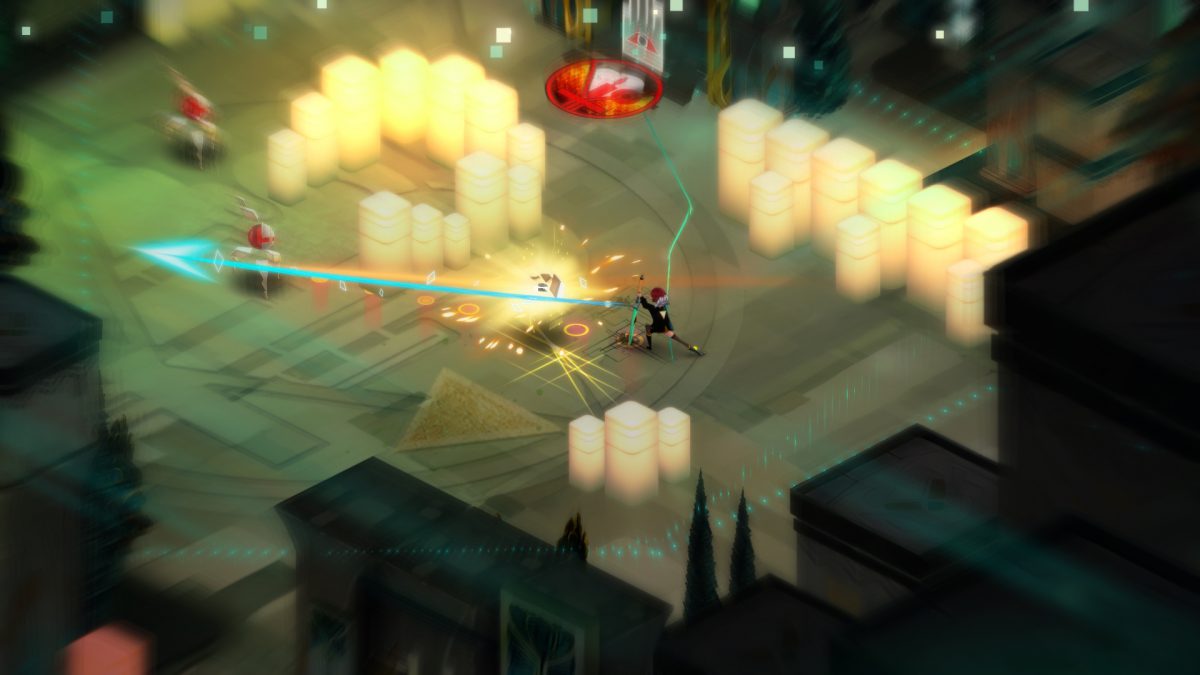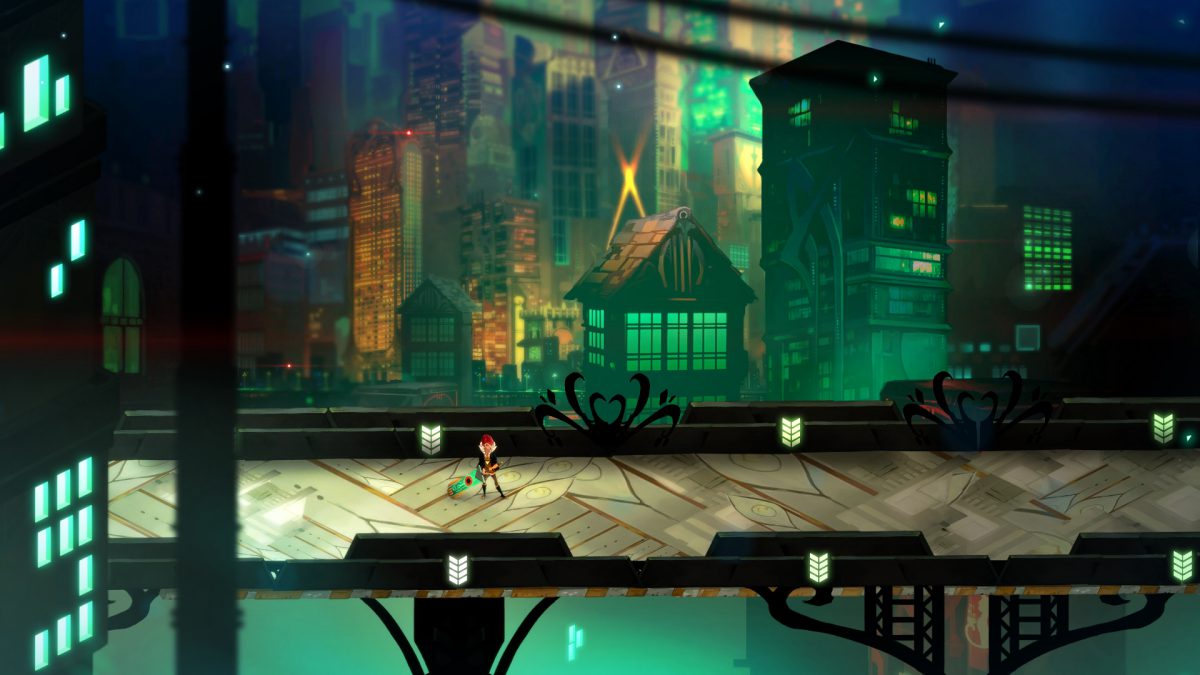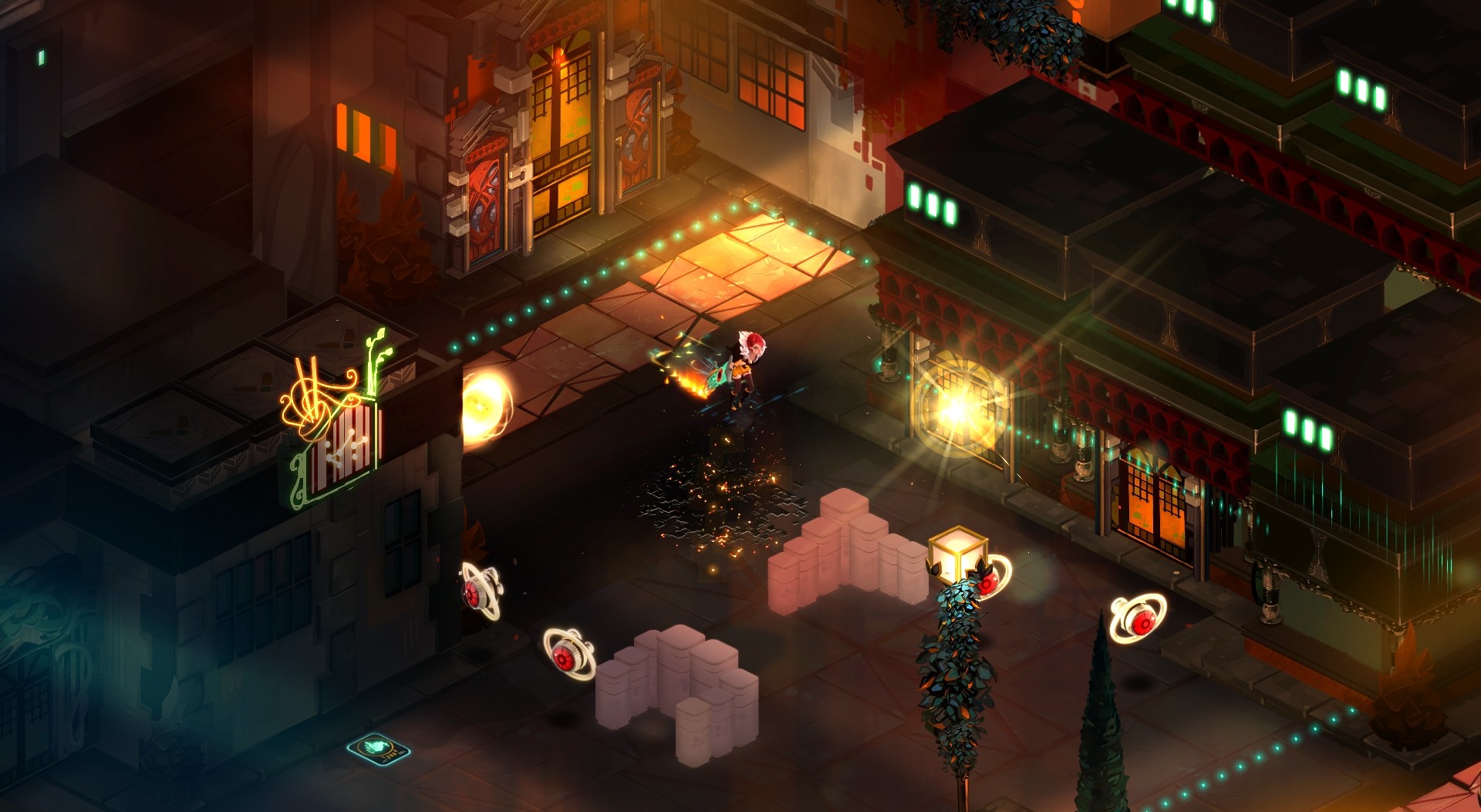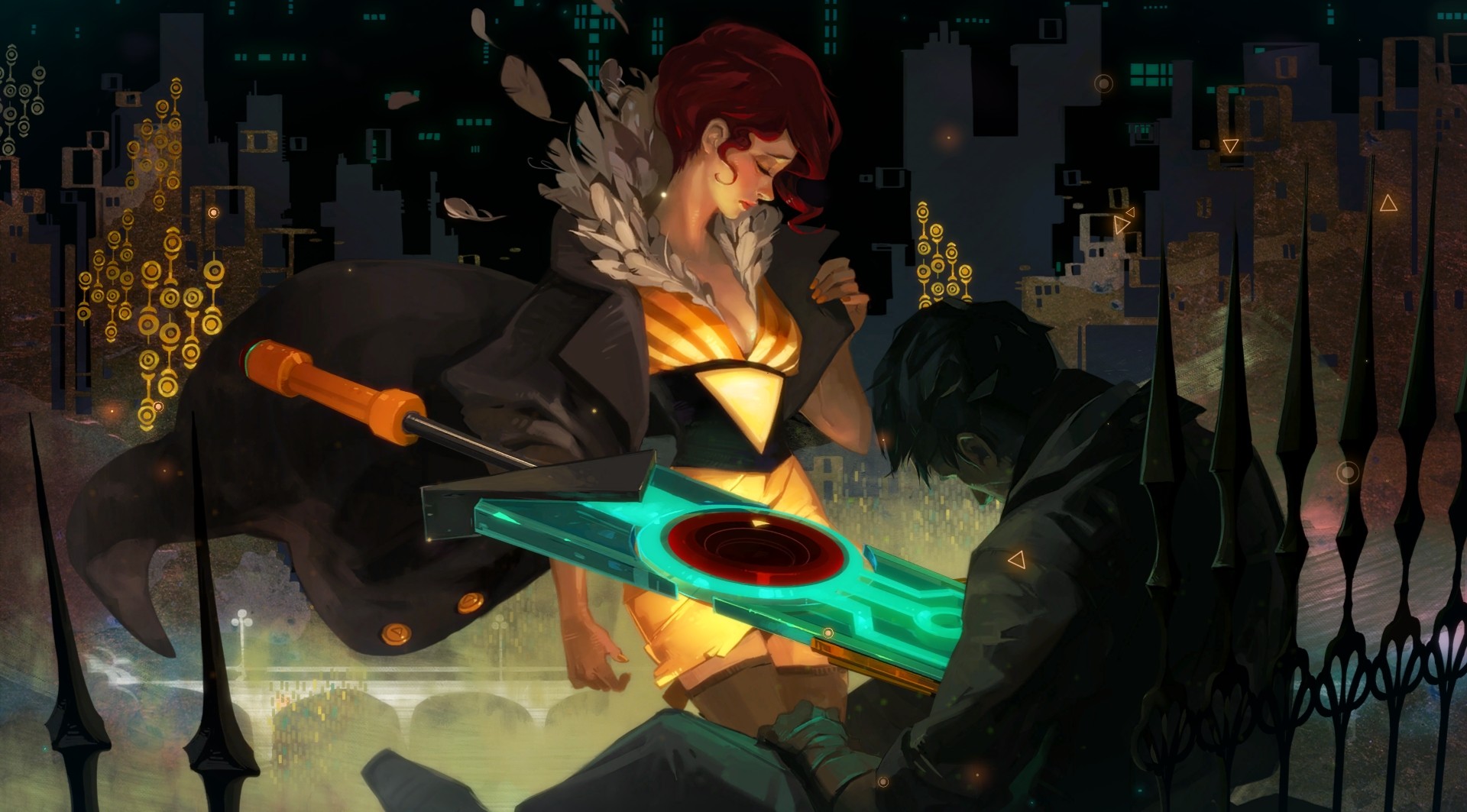Video games haven’t been a thing for me since I started undergrad in 2003, but after a friend of mine roped me into the annual Steam Summer Sale, I stumbled upon indie publisher Supergiant Games’ new title Transistor and was hooked the moment I watched its fascinating launch trailer:
Mysterious voiceover, light on details. Cyberpunk renaissance with a Ghost in the Shell vibe. Trippy downtempo tunes. Female lead.
I’m in.
Released in May 2014 to the PC and Playstation 4, Transistor is Supergiant Games’ follow up to its award-winning 2011 title, Bastion. Like Bastion, Transistor is a real-time, isometric action RPG. It stands apart from its predecessor tactically by introducing an interesting “strategic planning mode” called Turn(), where your protagonist is able to freeze time and executive a series of maneuvers against her opponents on the battlefield before they can move against you.
The real appeal of Transistor, however, isn’t in the novel game play or the beautiful, cell-shaded backdrops; it’s in the game’s powerful ability to immerse you in a narrative that unfolds as you play it. Transistor begins in media res: there’s no expository video to set the stage for the story, and no ham-handed tutorial to introduce the game’s controls. You’re delivered to the game’s primary setting, the seemingly electronic utopia of Cloudbank, as a singer-on-the-run named Red, and set loose with your unnamed talking-sword / traveling companion to solve the mystery of your betrayal (your voice has been stolen) with an immediacy that’s refreshing and highlights the urgency of your mission.

Transistor‘s setting is very carefully integrated with its trip hop score, which was composed by Darren Korb and includes haunting, bluesy vocals by Ashley Barrett. (Seriously—if you pick up the game and you’re a fan of bands like Portishead or Blue Foundation, buy the score.) In fact, one of my favorite features in the game is a button that does absolutely nothing tactically: you can press it and Red will hum to herself in tune with whatever track is currently playing in the background. It’s a neat integration with the score, but it also underscores the quiet suffering Red experiences with having her voice stolen—and that no element of the game is superfluous.
Where its gameplay and visual art call up a hybrid of JRPG classics like Chrono Trigger and Final Fantasy Tactics, its thematic underpinnings as a science fiction title combine so many ideas from seminal cyberpunk novels and films that you’ll feel right at home as a fan of the genre: the hacker love stories of William Gibson’s Sprawl Trilogy, the pop futurism of The Fifth Element, the vibrant cityscapes of Ridley Scott’s Blade Runner, and the neon-green terminal reality of the Wachowski’s The Matrix. All of this to say that Transistor gets a lot of mileage out of leaning on our shared cultural knowledge of science fiction tropes to create a world that’s experienced by the player as far richer than the game’s actual expository boundaries.
Supergiant Games has a penchant for direct dialogue with the player-as-protagonist as a vehicle for narration. In Bastion, a voiceover with a charming southern drawl tells you about the protagonist you’re playing in the third person, providing only the barest minimum of detail concerning what’s happening. Coupled with suggestive names for things in the game world, lush visuals, and a mood-setting soundtrack, Bastion relies on your imagination to extrapolate the world. This too is how Transistor accomplishes its narration, except that the synthesized voiceover of Logan Cunningham speaks directly to the protagonist, and you are carrying him in your hands—the Transistor weapon is Red’s lover, bridging the narrative distance between you beyond the fourth wall, and your role as Red, in the game.
“We like the reactivity [the voiceover] provides,” writes the game’s writer Greg Kasavin in an interview with VG247, “as we love those moments when you feel like the game you’re playing is responding to the way in which you’re playing it.” The revelatory narrative effect of the voiceover as controlled by the player is the ultimate in “showing” rather than “telling” narrative techniques, and something that video games as a medium for storytelling contribute to the craft that other mediums are mechanically incapable of.

Secretly, I’m a sucker for romances. Specifically, romances that involve unrequited love, or tragedy. [Here’s where things get spoilery, so stop here if you want to remain surprised.] Transistor is at its core a story about the nature of love in a world where everything is changing, and nothing is fixed. Not very different than our own, if you think about it. Red, the story’s protagonist, is a musician whose singing voice is so powerful that it can inspire the citizens of Cloudbank to action, and this catches the attention of a secret faction of city administrators called the Camerata. (As a sidebar: the styling of Red and Cloudbank vaguely remind me of indie scifi flick Mars et Avril, check it out.) The crux of the plot is this: Cloudbank is a simulation, and like the Strangers in the movie Dark City, a mysterious force of automatons called The Process rearrange the virtual architecture of the city to suit its citizens’ whims, based on democratic polls taken citywide. As the reveal trailer explains, “Everybody has a voice in Cloudbank.” Cloudbank’s inhabits actually answer questions like, “What weather would you like today?” or “Where would you like a bridge built?” and you can interact with terminals that change the game environment to this end.
Like all fictional utopias, Cloudbank doesn’t last long. The Camerata forms when one of the city’s engineers, Royce Bracket, discovers that although the whims of the people are constantly changing, their temperament is cyclical, and they’re not interested in his avant garde taste in city design. “When everything changes, nothing changes,” he says, a glum realization that even infinite possibility can get boring. In his research, he discovers a kind of the embedded system software that controls The Process, called Transistor. Thus Royce gets together with the games’ other would-be villains to hatch a plot that involves capturing all the most talented geniuses of Cloudbank’s reality—the people whose craft has the ability to inspire the people of Cloudbank to action—in order to rebuild Cloudbank anew.
Best laid plans, and all that. And so we end up with the game’s opening action: the Camerata try to stab Red with the Transistor, but her lover—the narrator, whom we’ll call Break(), after his attack “function” in the game—sacrifices himself to save her life. She ends up slightly wounded, the result of which is that the Transistor steals her voice instead of her “trace” (read: soul). Break(), on the other hand, ends up trapped in the Transistor. Red flees from the Camerata with the Transistor-as-Break() in tow, but without the Transistor in Royce’s control (it needs to be plugged into this thing called “The Cradle”), The Process goes haywire trying to fulfill Royce’s paradigm-shifting directive: to rebuild the city.

But this is where things get weird; Inception-y, if you will. The implication is that if Cloudbank’s citizens are dreamers existing in some kind of virtual reality, like consciousness supervening on the brain, they too must run on some kind of substrate like the brain—a physical or embedded hardware. Your Transistor, it so happens, contains traces of the dead personalities whom the Camerata were trying to integrate into their brave new world, including Red’s missing voice: and these traces make up the attack “functions” you use throughout the game, like Break().
There’s also mention of “going to the Country” when people die in Cloudbank, which alludes to natural death but is revealed in the story to be yet another reality outside Cloudbank. We learn, as the story progresses, that the Transistor is an instrument (as its name suggests), that directs the flow of power for The Process; notably, when Red and Break() encounter a very large Process called “The Spine of the World,” his voiceover seems to be experiencing serious lag.
In the final battle of Transistor, Red delivers the weapon to the Cradle, to regain control over The Process and essentially reset Cloudbank, and we’re taken to a place that looks suspiciously Country-like, with lots of Transistors in the background. On activating your Turn() meter, you’ll notice that each of the server-shaped containers on the battlefield are named after the people trapped in the Transistor, and there are more containers to be seen beyond the boundary of the playing field. Is this the “real world” where the physical bodies of Cloudbank’s inhabitants reside, a la The Matrix? Is it a self-enclosed “Back Door,” like the little island hideout Red visits to do practice runs against the Process? Are we inside the Transistor itself, at the heart of the Cloudbank simulation? Is this the Cradle, a central hub of sorts, where many Transistors interconnect to form the basis of Transistor‘s virtual reality? Or is this just another embedded “simulation within the simulation” that gives rise to Cloudbank and its inhabitants?

Good stories can be read a number of ways. They keep us coming back to them, to interrogate them, and are open to interpretation. Transistor is literally built to be read multiple times—its replay mode, called Recursive, harkens back to “New Game+” from Chrono Trigger, but more importantly reminds us that all stories are circular, all stories “recurse” into themselves to construct new meaning the more intimately we engage with them. It’s that search for honesty, the ability to express truths about the world in which we live through fiction, that keeps us chasing after a story’s narrative threads.
When Red decides to impale herself with the Transistor after defeating Royce and returning to Cloudbank with what is essentially world-building power, she chooses to inhabit the only story that can have real meaning for her: a story where she and Break() can be together, even if it entails being trapped in the Transistor with him in a simulation that’s less “real” than her already simulated life. In the end, it seems, the stories we choose to tell ourselves become our reality, and this understanding that Transistor imparts upon the player is why, for me, the game feels so thoroughly satisfying and complete.




Comments on Gone to the Country: Storytelling in Supergiant Games’ Transistor RPG
Neuffy
Thanks for this. It’s a nice write-up.